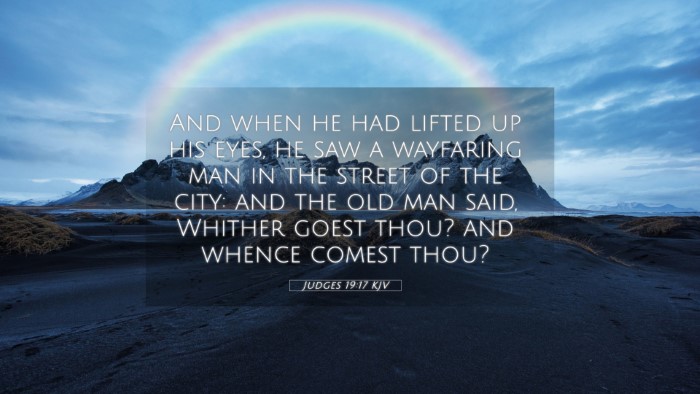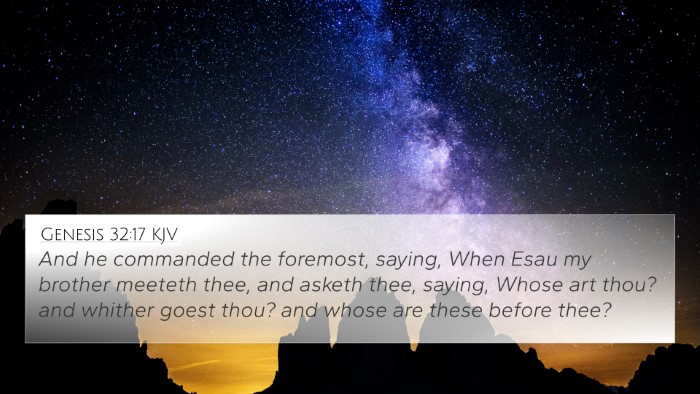Judges 19:17 - Verse Meaning and Interpretation
Judges 19:17 states: "And when he saw the traveler in the street of the city, he said, Whither goest thou? and whence comest thou?" This verse sets the stage for a significant narrative within the Book of Judges, which explores themes of hospitality, protection, and the moral decay in Israel during this period.
Summary of Commentary Insights
This verse introduces the reader to a Levite, who is inquiring about a stranger. The following insights from notable public domain commentators shed light on its meaning:
-
Matthew Henry:
Henry reflects on the importance of hospitality in Israelite society. The Levite's question implies a concern for the wellbeing of the traveler, highlighting cultural expectations of welcoming strangers, especially in a land riddled with moral challenges.
-
Albert Barnes:
Barnes suggests that this inquiry signifies a moment of connection between individuals amidst the chaos of the surrounding environment. The Levite's approach reveals a search for community and safety, essential during times of distress.
-
Adam Clarke:
Clarke emphasizes that the Levite is portrayed as a leader seeking to facilitate hospitality. His question not only seeks to gather information but also acts as a social engagement meant to foster support and mutual assistance.
Thematic Analysis
The verse encapsulates various themes that resonate throughout Scripture:
- Hospitality: The Levite's interaction highlights the expectation to care for travelers, reflecting Levitical laws and practices.
- Moral Decay: It provides a lens through which readers view the larger narratives of the Judges, depicting a society that struggles with ethical standards.
- Community Dynamics: The emphasis on inquiries about origins and destinations underlines the importance of relationships and communal living.
Bible Cross-References
Several related scriptures echo the themes present in Judges 19:17. Here are some notable cross-references:
- Genesis 18:1-5 - Abraham's hospitality toward three travelers exemplifies the virtue of welcoming strangers.
- Leviticus 19:34 - God's command to love the stranger aligns with the hospitable spirit depicted in the Levite's inquiry.
- Luke 10:33-34 - The Good Samaritan's parable reinforces the imperative to care for those in need.
- Hebrews 13:2 - This verse admonishes believers to show hospitality, for some have entertained angels unawares.
- Matthew 25:35 - In this teaching, Jesus identifies himself with those who are in need, emphasizing the importance of helping the stranger.
- Ruth 2:10 - Ruth's respect and seeking refuge illustrate the principles of kindness and reception found in the Old Testament.
- Acts 28:7 - The hospitality shown by the people of Malta towards Paul embodies the continuation of such communal values in the early Church.
- Proverbs 27:10 - "Better is a neighbor who is near than a brother far away," complements the Levite's desire for community in this verse.
- James 2:15-17 - James discusses the faith that is impotent without accompanying acts of mercy, resonating with the Levite’s thoughtful questions.
- 1 Peter 4:9 - Peter encourages believers to be hospitable without complaint, echoing the essence of human connection in times of need.
Encouragement for Study
Engaging with Judges 19:17 offers a deeper understanding of biblical themes related to hospitality and community. Utilizing tools for Bible cross-referencing can provide further insights into the narrative and connect it to broader scriptural truths.
Conclusion
In exploring Judges 19:17, we not only see a Levite reaching out to a traveler but also a call for compassion and moral vigilance within the community. By examining cross-references, one can uncover a wealth of connections that enrich our understanding of biblical text and its application in our lives.




